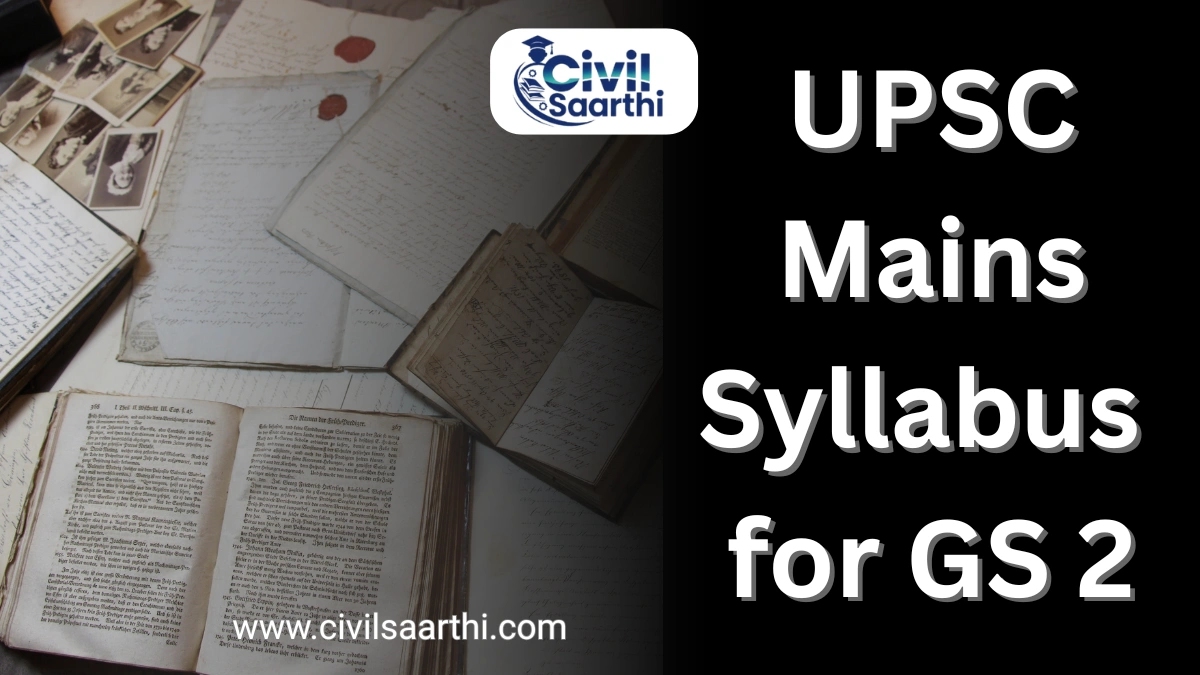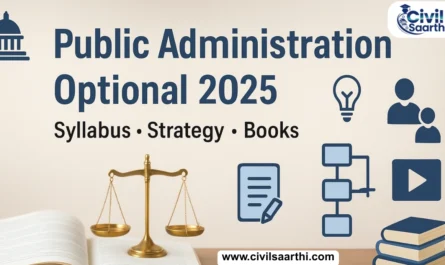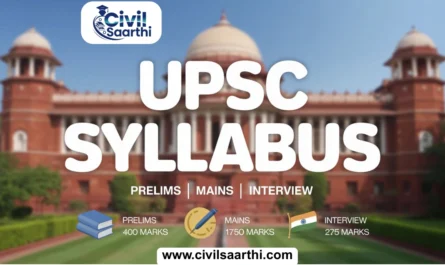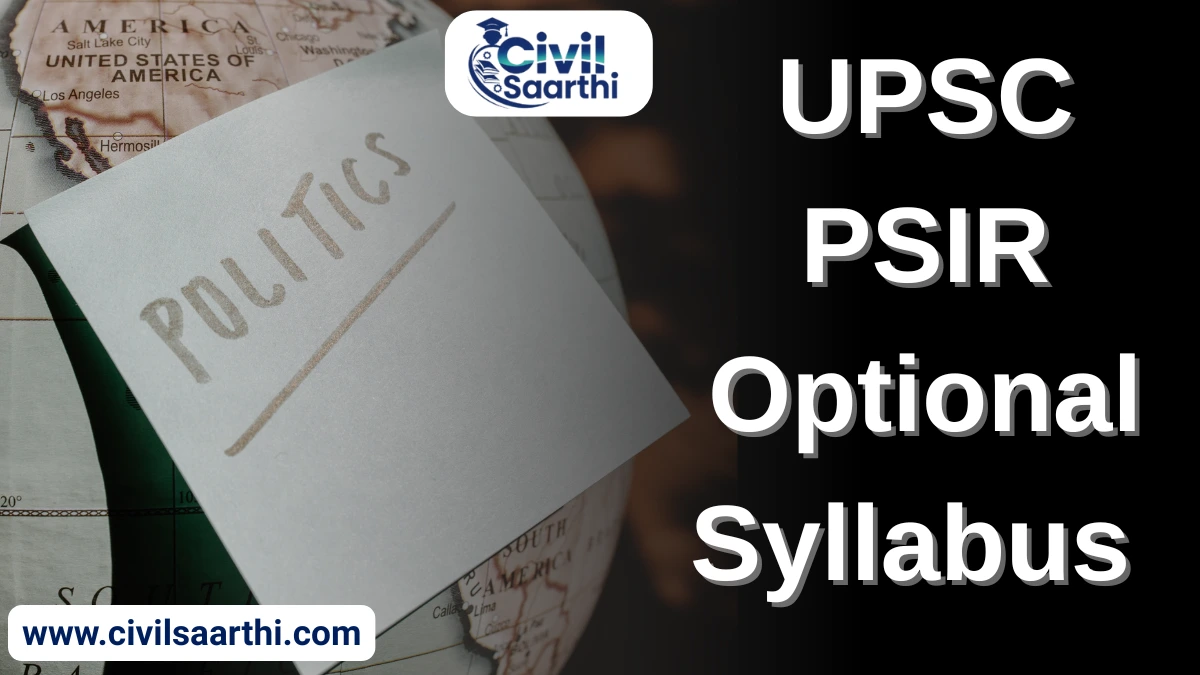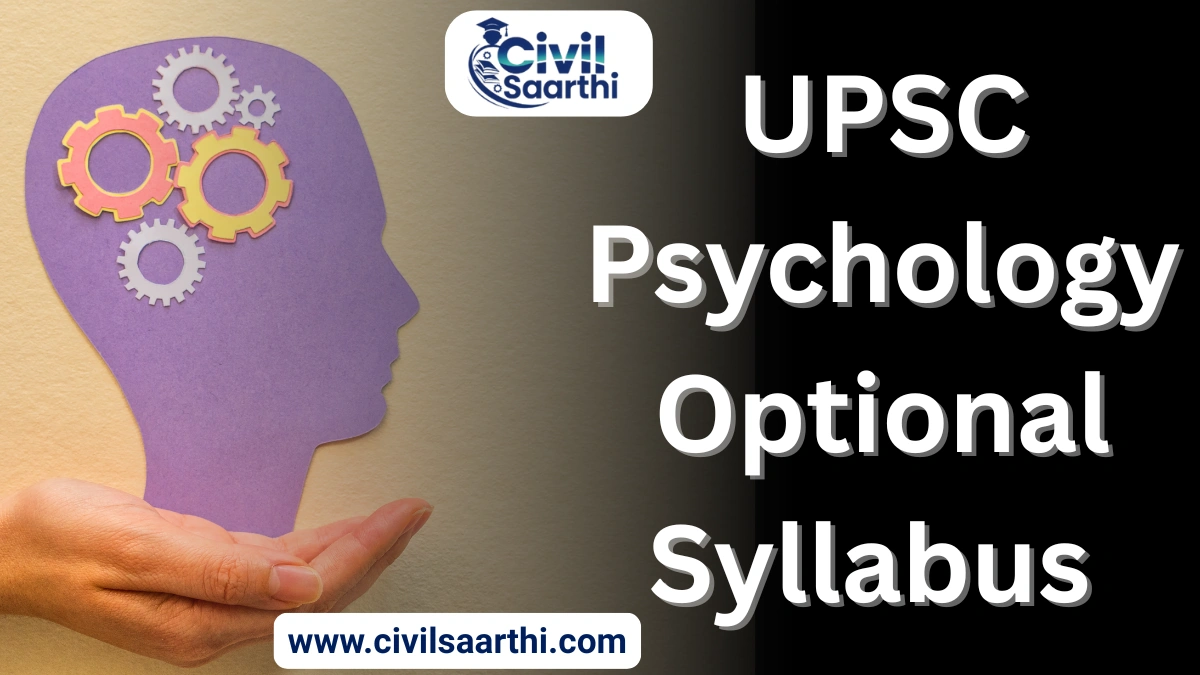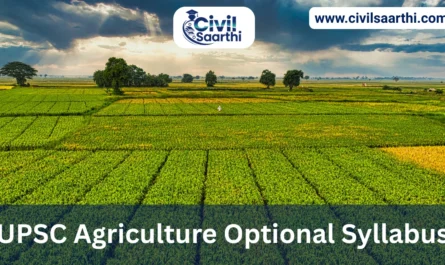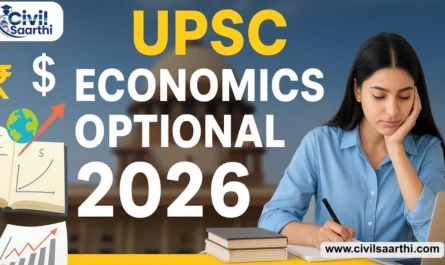The UPSC Mains Syllabus 2025 for GS 2 is a critical component of the Civil Services Examination, focusing on governance, polity, social justice, and international relations. This paper assesses a candidate’s understanding of the Indian political system, constitutional framework, and the country’s role in global affairs. A thorough grasp of these topics is essential for aspirants aiming to contribute effectively to public administration and policy-making..
UPSC Mains Syllabus 2025 for GS 2 Overview
The UPSC Mains Syllabus 2025 for GS 2 encompasses critical areas such as governance, constitution, polity, social justice, and international relations. This paper assesses a candidate’s understanding of the Indian political system, policy implementation, and India’s role in global affairs.
UPSC Mains Syllabus 2025 for GS 2 Overview | |
| Main Topics | Subtopics |
| Indian Constitution | Historical underpinnings, evolution, features, amendments, significant provisions, basic structure |
| Governance | Functions and responsibilities of the Union and the States, federal structure issues, devolution of powers |
| Separation of Powers | Distribution among various organs, dispute redressal mechanisms, institutions |
| Comparison of Constitutions | Indian constitutional scheme vs. other countries |
| Parliament and State Legislatures | Structure, functioning, conduct of business, powers & privileges, issues arising |
| Executive and Judiciary | Structure, organization, functioning |
| Ministries and Departments | Roles of various ministries and departments, pressure groups, formal/informal associations |
| Social Justice | Welfare schemes, mechanisms, laws, institutions for vulnerable sections |
| International Relations | India’s neighborhood relations, bilateral/regional/global groupings and agreements |
UPSC Mains Syllabus 2025 for GS 2 : PAPER-III
General Studies- II: Governance, Constitution, Polity, Social Justice and International relations.
- Indian Constitution—historical underpinnings, evolution, features, amendments, significant provisions and basic structure.
- Functions and responsibilities of the Union and the States, issues and challenges pertaining to the federal structure, devolution of powers and finances up to local levels and challenges therein.
- Separation of powers between various organs dispute redressal mechanisms and institutions.
- Comparison of the Indian constitutional scheme with that of other countries.
- Parliament and State legislatures—structure, functioning, conduct of business, powers & privileges and issues arising out of these.
- Structure, organization and functioning of the Executive and the Judiciary—Ministries and Departments of the Government; pressure groups and formal/informal associations and their role in the Polity.
- Salient features of the Representation of People’s Act.
- Appointment to various Constitutional posts, powers, functions and responsibilities of various Constitutional Bodies.
- Statutory, regulatory and various quasi-judicial bodies.
- Government policies and interventions for development in various sectors and issues arising out of their design and implementation.
- Development processes and the development industry —the role of NGOs, SHGs, various groups and associations, donors, charities, institutional and other stakeholders.
- Welfare schemes for vulnerable sections of the population by the Centre and States and the performance of these schemes; mechanisms, laws, institutions and Bodies constituted for the protection and betterment of these vulnerable sections.
- Issues relating to development and management of Social Sector/Services relating to Health, Education, Human Resources.
- Issues relating to poverty and hunger.
- Important aspects of governance, transparency and accountability, e-governance- applications, models, successes, limitations, and potential; citizens charters, transparency & accountability and institutional and other measures.
- Role of civil services in a democracy.
- India and its neighborhood- relations. Bilateral, regional and global groupings and agreements involving India and/or affecting India’s interests.
- Effect of policies and politics of developed and developing countries on India’s interests, Indian diaspora.
- Important International institutions, agencies and fora- their structure, mandate.
UPSC Mains Syllabus 2025 for GS 2: Topic-wise
1. Indian Constitution
- Historical underpinnings, evolution, and making of the Constitution
- Features of the Constitution
- Preamble, Fundamental Rights, Directive Principles of State Policy (DPSP), and Fundamental Duties
- Amendments to the Constitution; important amendments
- Basic Structure Doctrine
- Judicial Review and Judicial Activism
2. Functions and Responsibilities of the Union and the States
- Division of powers between Centre and States (Union, State, and Concurrent List)
- Issues and challenges in Centre-State relations
- Inter-State relations – river water sharing, boundary issues, etc.
3. Separation of Powers
- Doctrine of Separation of Powers
- Role of Executive, Legislature, and Judiciary
- Judicial overreach and activism
- Checks and balances mechanism
4. Comparison of the Indian Constitutional Scheme with Other Countries
- Comparison with the UK, USA, France, Russia, South Africa, etc.
- Parliamentary vs Presidential system
- Bill of Rights vs Fundamental Rights
5. Parliament and State Legislatures
- Structure, functioning, and powers of Lok Sabha & Rajya Sabha
- Legislative process
- Role of Speaker, Chairman, and Committees
- Parliamentary privileges and issues arising out of them
6. Structure, Organization, and Functioning of the Executive and the Judiciary
- President, Prime Minister, Council of Ministers, Cabinet Committees
- Governor and Chief Minister
- Supreme Court, High Courts, Tribunals – structure and jurisdiction
- Judicial reforms and pendency issues
7. Ministries and Departments of the Government
- Roles and responsibilities of key Ministries (Home, Finance, External Affairs, etc.)
- Role of Civil Services in a democracy
8. Pressure Groups and Formal/Informal Associations
- Role of pressure groups in Indian polity
- NGOs, SHGs, trade unions, and their influence
- Lobbying and its impact on policy making
9. Salient Features of the Representation of People’s Act (RPA)
- Provisions of RPA, 1950 and 1951
- Electoral reforms
- Issues related to criminalization of politics and election funding
10. Appointment to Various Constitutional Posts
- Appointment process, powers, and responsibilities of:
- President, Vice-President, Governor
- Chief Election Commissioner, CAG, Attorney General, Advocate General
- UPSC and State PSCs, Finance Commission
11. Statutory, Regulatory, and Quasi-Judicial Bodies
- NITI Aayog, NHRC, NCW, NCPCR, CIC, CVC, CBI, TRAI, SEBI, RBI, etc.
- Roles, responsibilities, autonomy, and accountability
12. Government Policies and Interventions
- Welfare schemes for vulnerable sections – women, children, elderly, disabled, minorities, SC/ST/OBC
- Issues arising out of their design and implementation
- Role of technology in governance
13. Development Processes and the Role of NGOs, SHGs, Donors, Charities, and other Stakeholders
- PPP (Public-Private Partnership) models
- Corporate Social Responsibility (CSR)
- Community-based organizations and development participation
14. Welfare Schemes for Vulnerable Sections of the Population
- Central and State Government schemes – implementation, benefits, and challenges
- Social sector initiatives in health, education, and nutrition
15. Issues Relating to Development and Management of Social Sector/Services
- Education – NEP 2020, Right to Education
- Health – National Health Policy, Ayushman Bharat
- Nutrition – POSHAN Abhiyaan
- Human Resources – skill development and employment generation
16. Issues Relating to Poverty and Hunger
- Multidimensional Poverty Index (MPI)
- Government measures – PDS, MGNREGA, NFSA
- Evaluation of outcomes and persistent gaps
17. Important Aspects of Governance
- Transparency and accountability
- E-governance applications
- Citizen charters, RTI Act
- Role of social audit and grievance redressal mechanisms
18. Role of Civil Services in a Democracy
- Civil services reforms
- Code of ethics and accountability
- Role in implementation of policies and governance
19. India and Its Neighborhood – Relations
- Bilateral and multilateral relations with:
- Pakistan, China, Bangladesh, Nepal, Bhutan, Myanmar, Sri Lanka, Maldives, Afghanistan
- Border issues, regional cooperation, SAARC, BIMSTEC
20. Bilateral, Regional, and Global Groupings and Agreements
- India’s participation in UN, WTO, ASEAN, SCO, BRICS, G20, QUAD, etc.
- FTA and other international agreements
21. Effect of Policies and Politics of Developed and Developing Countries on India’s Interests
- India-US, India-EU, India-Russia, India-Japan relations
- Strategic alliances and their global implications
22. Important International Institutions, Agencies, and Fora
- UN, WHO, IMF, World Bank, WTO, IAEA, FATF, etc.
- Roles, mandates, and India’s position
Important Books to Read for UPSC Mains GS 2 Paper III
These are important books to be read for UPSC Mains GS 2 Paper III. Candidates can go through the table below to get detailed guide on topics and related books for UPSC Mains Exam.
Important Books to Read for UPSC Mains GS 2 Paper III | |||
| Topic | Recommended Books | Author/Publisher | Remarks |
| Indian Constitution | Indian Polity | M. Laxmikanth | Core book; must-read for conceptual clarity |
| Constitution Analysis | Introduction to the Constitution of India | D.D. Basu | For analytical and legal understanding |
| Governance | Governance in India | M. Laxmikanth | Covers topics like transparency, accountability |
| Social Justice & Welfare Schemes | Social Problems in India | Ram Ahuja | Useful for welfare issues, social sectors |
| Indian Administration | Indian Administration | Rajni Goyal & Ramesh Arora | Good for understanding civil services and governance |
| Current Affairs (Polity & IR) | Yojana, Kurukshetra, PIB, PRS | Monthly Magazines | Essential for government schemes and policy developments |
| International Relations | India’s Foreign Policy | Rajiv Sikri | Covers bilateral and multilateral relations well |
| Comparative Politics | Comparative Politics Made Simple (Optional) | R. Kumar | Basic understanding for comparing constitutions |
| Acts & Governance Reports | 2nd ARC Reports (Relevant chapters) | Government of India | Governance reforms and policy analysis |
| Schemes & Policies | NITI Aayog, Budget, Economic Survey | Government Sources | Must-read for updated schemes and performance reviews |
Preparation Tips for UPSC Mains GS Paper 2
Here is the Preparation Tips for UPSC Mains GS Paper 2 tabulated below based on the experiences of UPSC Toppers.
| Category | Tips |
| Understanding the Syllabus | Break down the syllabus into micro-topics for focused preparation. Use previous year questions (PYQs) to identify recurring themes. |
| Content Building | Stick to standard sources: Laxmikanth, ARC Reports, Yojana, PIB, PRS India. Make crisp notes on articles, amendments, landmark judgments, and case studies. |
| Answer Writing | Use intro-body-conclusion format. Begin with a constitutional article or committee report when applicable.- Include examples, SC judgments, and data (e.g., NCRB, NITI Aayog stats). Use flowcharts or diagrams where appropriate to save time. |
| Value Addition | Quote relevant articles of the Constitution. Mention Supreme Court rulings (e.g., Kesavananda Bharati, S.R. Bommai). Include commissions and committees (e.g., Sarkaria, Punchhi, ARC). |
| Current Affairs Linkage | Correlate static concepts with recent policy developments. Refer to recent bills, acts, governance reforms, and international developments. |
| Time Management | Allocate ~7 minutes per 10-marker and ~11 minutes per 15-marker. Don’t get stuck on one question – maintain flow and finish the paper. |
| Presentation | Use headings and subheadings. Underline key points/terms with a pencil. Maintain clean handwriting and consistent structure. |
| Practice & Mock Tests | Write 2–3 answers daily on current GS 2 themes. Join a good test series for timely feedback and improvement. |
| Common Mistakes to Avoid | Avoid excessive theoretical content without real-life examples. Don’t ignore IR and governance topics – they carry weight. Lack of conclusion or poor formatting can cost marks. |
| Revision Strategy | Revise GS 2 notes weekly. Use self-made short notes, flowcharts, and one-pagers for revision. |
Important Books for UPSC Mains GS Paper 2
The List of Important Books for UPSC Mains GS Paper 2 has been tabulated below based on the experts and toppers advice.
Important Books for UPSC Mains GS Paper 2 | |||
| Topic | Recommended Books | Author / Publisher | Remarks |
| Indian History (Ancient & Medieval) | Old NCERT History (Class 11) | RS Sharma (Ancient), Satish Chandra (Medieval) | Strong foundation with concise content |
| Tamil Nadu Board Class 11-12 History Books | TN Board | Very useful for quick revision and visual understanding | |
| Modern Indian History | Modern India | Bipan Chandra | Most referred book for colonial era and freedom struggle |
| Spectrum: A Brief History of Modern India | Rajiv Ahir | Exam-focused; ideal for quick revision & facts | |
| World History | History of the World | Arjun Dev | Covers major world events from 18th to 20th century |
| Mastering Modern World History (Optional) | Norman Lowe | In-depth but lengthy; use selectively | |
| Indian Society | Indian Society | Ram Ahuja | Good for sociological perspective and social issues |
| Social Problems in India | Ram Ahuja | Covers caste, poverty, gender, and marginalization | |
| Geography (Physical, Human, and Indian) | NCERT Geography Class 11 & 12 | NCERT | Clear explanations; must-read basics |
| Certificate Physical and Human Geography | G.C. Leong | Compact and concept-focused for physical geography | |
| Oxford School Atlas | Oxford University Press | Useful for map practice and regional clarity | |
| Current Affairs Linkage | Yojana, Kurukshetra, The Hindu, Indian Express, PIB | Monthly Magazines & Daily News | Connect dynamic content with static topics (especially society & geography) |
UPSC Mains Syllabus 2025 for GS 2 FAQs
What is the focus of the UPSC Mains Syllabus 2025 for GS 2?
The UPSC Mains Syllabus 2025 for GS 2 focuses on polity, constitution, governance, social justice, and international relations.
Is the UPSC Mains Syllabus 2025 for GS 2 only about the Indian Constitution?
No, it also includes government policies, institutions, welfare schemes, and India’s foreign relations.
How important is current affairs for the UPSC Mains Syllabus 2025 for GS 2?
Current affairs are very important as questions are often linked with recent government initiatives and international developments.
Are international relations part of the UPSC Mains Syllabus 2025 for GS 2?
Yes, topics like India’s relations with neighboring countries, bilateral agreements, and regional groupings are included.
Do I need to study state legislatures for the UPSC Mains Syllabus 2025 for GS 2?
Yes, both Parliament and State Legislature structures, powers, and issues are part of the syllabus.
What kind of questions are asked from social justice in the UPSC Mains Syllabus 2025 for GS 2?
Questions usually focus on welfare schemes, vulnerable sections, and the effectiveness of related laws and institutions.
Which books are helpful for the UPSC Mains Syllabus 2025 for GS 2?
Recommended books include Laxmikanth for Polity, ARC Reports, and current affairs magazines like Yojana and Kurukshetra.

